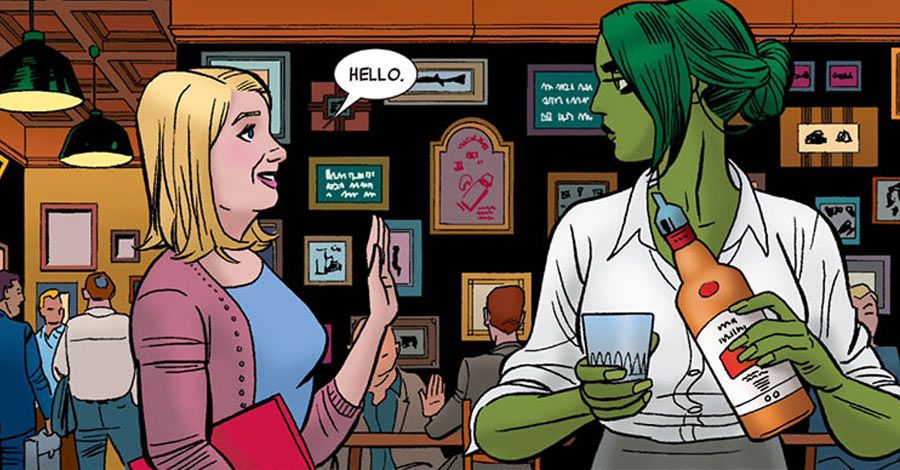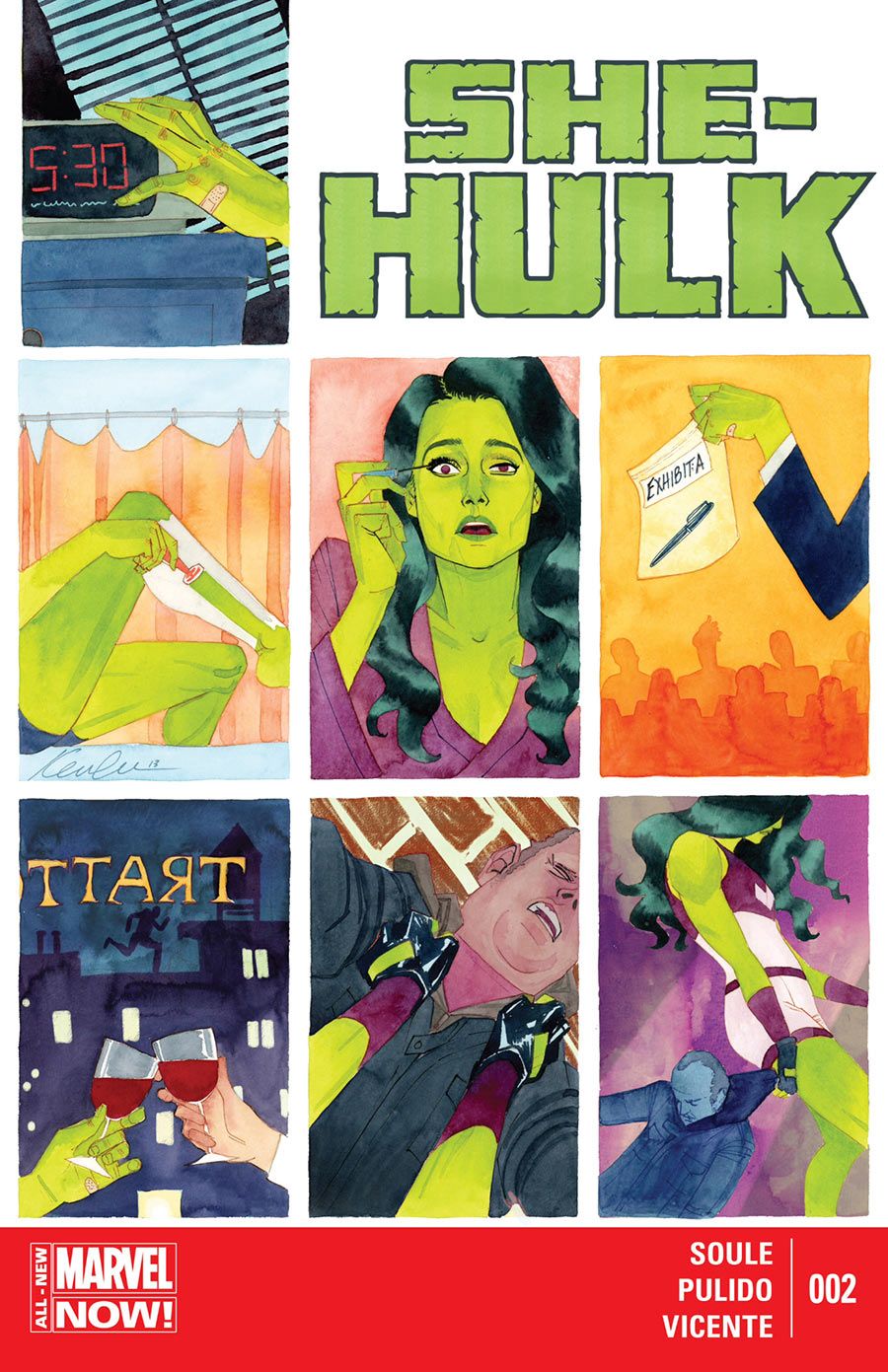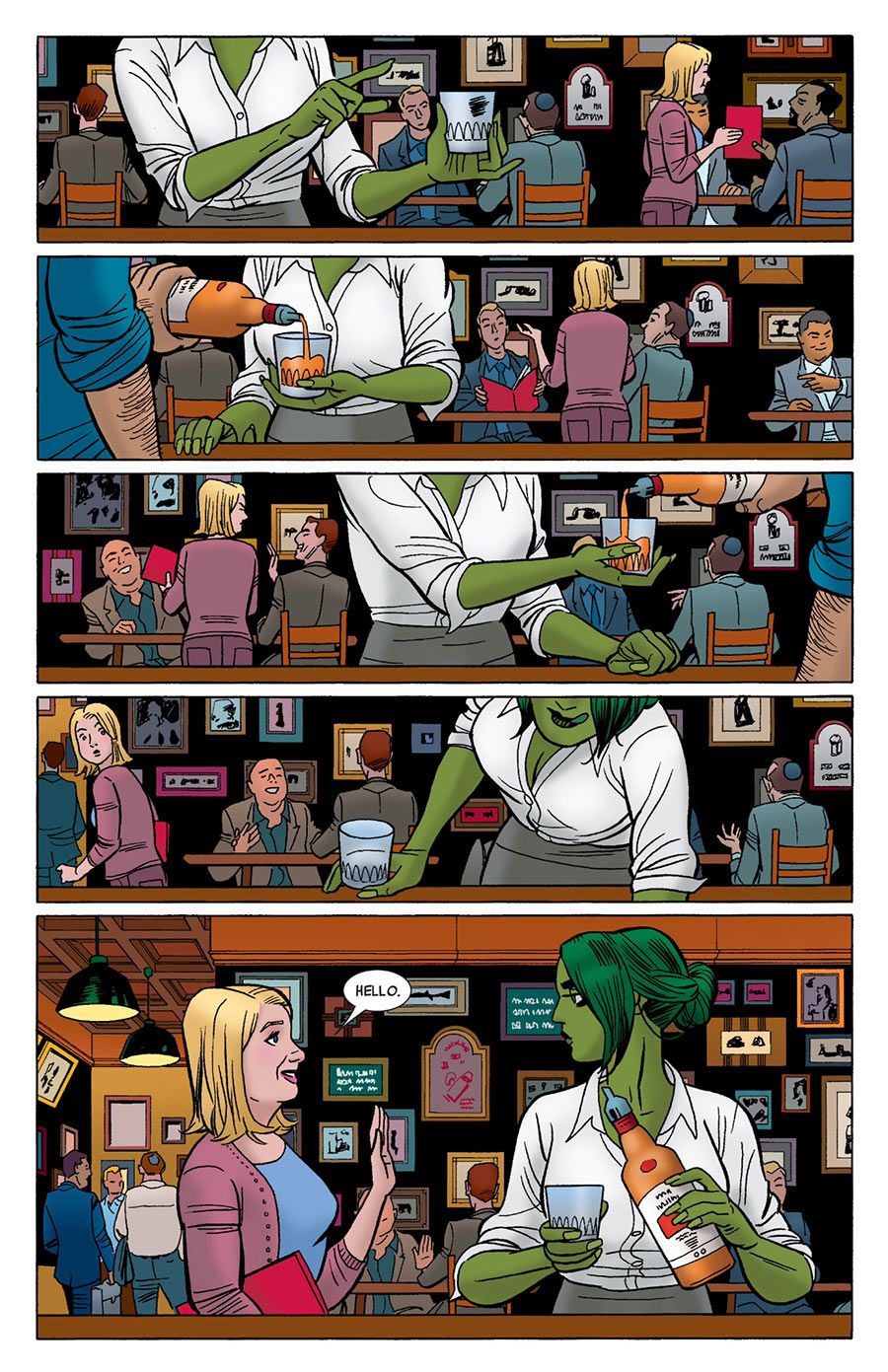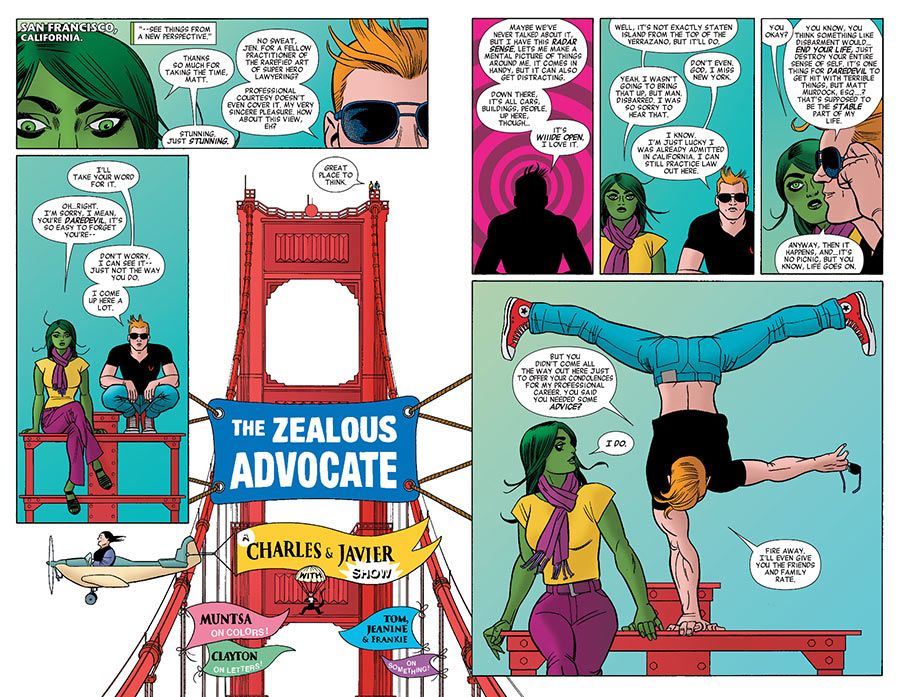I really wanted to come back to IN YOUR FACE JAM after a few weeks away and radiate good vibes. That didn't seem like too much to ask, because a lot of great stuff has happened in the past few weeks. I'm reading and enjoying DC Comics again thanks to "Batgirl" and "Gotham Academy"! "Agents of S.H.I.E.L.D." has had a string of stellar episodes this season, and Adrianne Palicki owned it as Mockingbird! Even though I've only read maybe a dozen Flash comics in my life, I still teared up at the CW adaptation's pilot; the show's really fun!
You guys, I went to New York Comic Con and I met Foggy Nelson (shout out to Arune Singh and Judy Stephens for making this happen/capturing this moment). I mean, I met the actor playing Foggy, Elden Henson -- who now has IN YOUR FACE JAM's full endorsement. He was incredibly awesome to me, despite my fumbling with the words and probably too-big grin, and the footage I saw during the panel left me with an even bigger grin. Speaking of that panel, head of Marvel TV Jeph Loeb introduced Henson by saying, and I paraphrase, "Articles have been written about the importance of Foggy Nelson." My jaw dropped when I heard that, because I'm the guy that wrote this. If there's anyone else out there writing thousand-plus word essays about Franklin Nelson, please let me know -- we need to be Twitter friends.
It's been a pretty great few weeks, but unfortunately I can't talk about any of that right now, because I'm too busy grieving the loss of "She-Hulk." Marvel's just-released solicits for January 2015 broke my heart in the way that only comic book solicitations can -- that is to say that the heart-breaking is incredibly low stakes, niche and filled with equal parts frustration and sadness.
I'm sad because ever since I wrote about the danger of the disappearing X-Men, I've been trying to figure out which non-mutant super heroes I gravitate towards. Of all the heroes that could actually show up on new merchandise or potentially appear in a video game, which ones can I really call my favorites? Scarlett Johansson's Black Widow is my favorite live-action comic book hero. My decade-plus affection for Carol Danvers means that the quickest way to get me both pumped up and choked up at a convention is to put me in the front row of a Carol Corps event. I will always think Luke Cage and Iron Fist are incredibly awesome characters. I love all these guys, but I realized that I really love Daredevil and She-Hulk.
I'll hold off on diving into my DD appreciation for a more appropriate time -- he does have a fantastic looking Netflix show coming out next year, after all. Let's talk instead about She-Hulk. Okay, I've actually already written a whole IN YOUR FACE JAM about She-Hulk -- but that was before Jennifer Walters got an ongoing series from Charles Soule and Javier Pulido. Now, I've read some She-Hulk in my time. Dan Slott's run kept me interested in comics in the mid-'00s and made me fall in love with the character. John Byrne's run is a fascinating time capsule of late '80s fashion and comic book behind-the-scenes politics that also holds up as outrageously enjoyable. David Anthony Kraft and Mike Vosburg built up a solid character from a foundation hastily laid down by Stan Lee in Shulkie's first ongoing series. Jen has been associated with a lot of fantastic writers in her thirty-four years in the Marvel Universe. Soule and Pulido built upon all of that to create what should be hailed as the perfect She-Hulk series.
Jen's a complex character, and any ongoing series of hers could tell solid stories just by focusing on one of her traits. Byrne upped the action and adventure, Slott focused on her law career, Peter David turned her into a bounty hunter -- all choices that resulted in unique takes on the character. Soule did not see fit to just focus on just one side of Jen's personality; he made her both a lawyer and a super hero and a fun-loving woman by both day and night. Her courtroom battles were punctuated by an altercation with Doctor Doom and a team up with Ant-Man. She drank off her worries at the lawyer bar and fought A.I.M. robots with Patsy "Hellcat" Walker after a night out on the town. Kevin Wada's excellent cover for "She-Hulk" #2 conveys Jen's jam-packed schedule perfectly. Soule took all the elements that worked for She-Hulk in the past and made them all work together in one series.
I was so excited to see Javier Pulido launch a book at Marvel, especially a book like "She-Hulk." Pulido has pulled no punches on every issue he's illustrated. His storytelling is clear yet detailed, dynamic yet restrained, and somehow looks incredibly modern while drawing so much inspiration from the Silver Age of comics. From facial expressions (a double page spread of just Jen's hulking out eyes, Patsy's grin while poking her head out of a limo's sunroof) to the way he illustrates the subtle passage of time (more stacks of paper in one sequence, the shuffling of background "extras" in another), every line in every one of Pulido's panels -- enhanced by Muntsa Vicente's eye-catching and fun-loving colors -- is captivating and compelling.
I probably shouldn't have waited a year to praise this book. The twelfth issue will be the final one, meaning that I only have three more issues left with my favorite non-X-character. I'm surprised that this has bummed me out as much as it has; after all, I'm the guy that just one year ago gave words of advice to new comic readers upset about the end of "Fearless Defenders." Why is this hitting me so hard when I took the end of another favorite series, "Superior Foes of Spider-Man," in stride?
Probably because I wasn't blindsided by either one of those cancellations.
I know from experience ("Slingers," "Defenders," "Alpha Flight," "New Warriors") that team books built around C-List characters don't last. She-Hulk, though, has a track record. The girl's got over 150 comics bearing her name -- the most of any female Marvel hero. I think I just assumed that Soule and Pulido's run would make it past a year, if not five. I wanted this "She-Hulk" ongoing to keep going on and on.
And that's the problem right there -- the word "ongoing." If Marvel had announced Soule and Pulido's "She-Hulk" as a twelve-issue volume, I would not feel all the feels I'm feeling right now. That's why "Superior Foes" felt like a victory even after the book's final issue was solicited; the creators had been very open about the fact that the series was supposed to end earlier and got extra issues due to positive fan response. I would much rather be pleasantly surprised by a limited series going into bonus issues than feeling let down by the stifled potential of a cancelled unlimited series. I loved being aware that "Superior Foes" had gotten extra issues; it made me feel like all the social media dust I kicked up for that book paid off for the first time ever.
I think there's an easy way to get the word "cancelled" out of people's heads and to do away with all the negative vibes associated with a book's finale. Bill them as twelve-issue events up top, so the die-hard fandoms that build up around books like "Fearless Defenders" and "All-New X-Factor" know there's a predetermined beginning, middle and end to their new favorite series. Separating "Hawkeye" into creator-specific volumes seems to have kept Clint's new fanbase appeased, and announcing Jeff Lemire and Ramon Perez's relaunch helped assuage fan fears of potentially going without Kate Bishop snark.
I'm sure there are practical or tradition-based reasons why books are still marketed as "ongoing" when the market itself barely seems capable of keeping series around for longer than 20 issues. Excluding "Fantastic Four," which is receiving a commemorative restoration of it's original numbering before it's cancellation, the average issue number of Marvel's 56 ongoing series in their January solicits is 11.4. 32% of those ongoings have four or fewer issues out; only 11% have over 25 issues. I would rather all books be officially called limited series until a company decides otherwise.
It's very telling that the current comics market cannot support a fantastic book like "She-Hulk," which is a completely accessible series with witty writing and crystal clear art that never once got mixed up in crazy continuity or convoluted crossovers. "She-Hulk's end has me asking the same questions that have been asked of our industry for years now. Why aren't comics in places other than comic book stores anymore? Why are digital sales kept secret? Why are we still committed to the monthly single-issue format or nothing else? Why are big comics marketed to the masses on MTV or "The View" three months before they go on sale, and why do we expect potential readers -- which outnumber the couple hundred thousand monthly comic book readers by a bajillion -- to adhere to this labyrinthine pull-list based system?
As far as we know, because digital sales figures remain elusive, single-issue sales mean the most. "She-Hulk" apparently did not meet whatever levels it had to in order to continue. I don't look at Diamond sales charts as a rule, because it just bums me out to see nothing but event books up top and my favorite hero books at the bottom -- but I did for this article. It's depressing. "She-Hulk" #8 sold 21,349 copies. Hovering around it? Books I love like the not canceled "Storm" #3 (22,078), "Captain Marvel" #7 (21,022) and "Black Widow" #10 (23,687). I stress that they're not canceled only to avoid freak-outs and unnecessary panic, but I feel the need to point out those other fantastic comics since I weirdly feel a strong sense of guilt for not talking more about "She-Hulk," and for not being aware of what it was selling. I should have written about it more, I should have bought copies for my friends who love law procedurals and/or badass leading women. If you love "She-Hulk," still do all of that. If you love the books I just pointed out, definitely do all of that.
There was no problem with "She-Hulk," and I'm grateful Marvel gave her another series with the creators involved. I just want things to change so that we can erase the disappointment that comes with the word "cancelled." There's a difference between knowing a book is ending and having it yanked away. The term "ongoing" feels like a promise no company can keep.
Brett White is a comedian living in New York City. He co-hosts Matt & Brett Love Comics, writes for the sketch comedy podcast Left Handed Radio, and makes videos for the Upright Citizens Brigade as a member of UCB1. His opinions can be consumed in bite-sized morsels on Twitter (@brettwhite).




